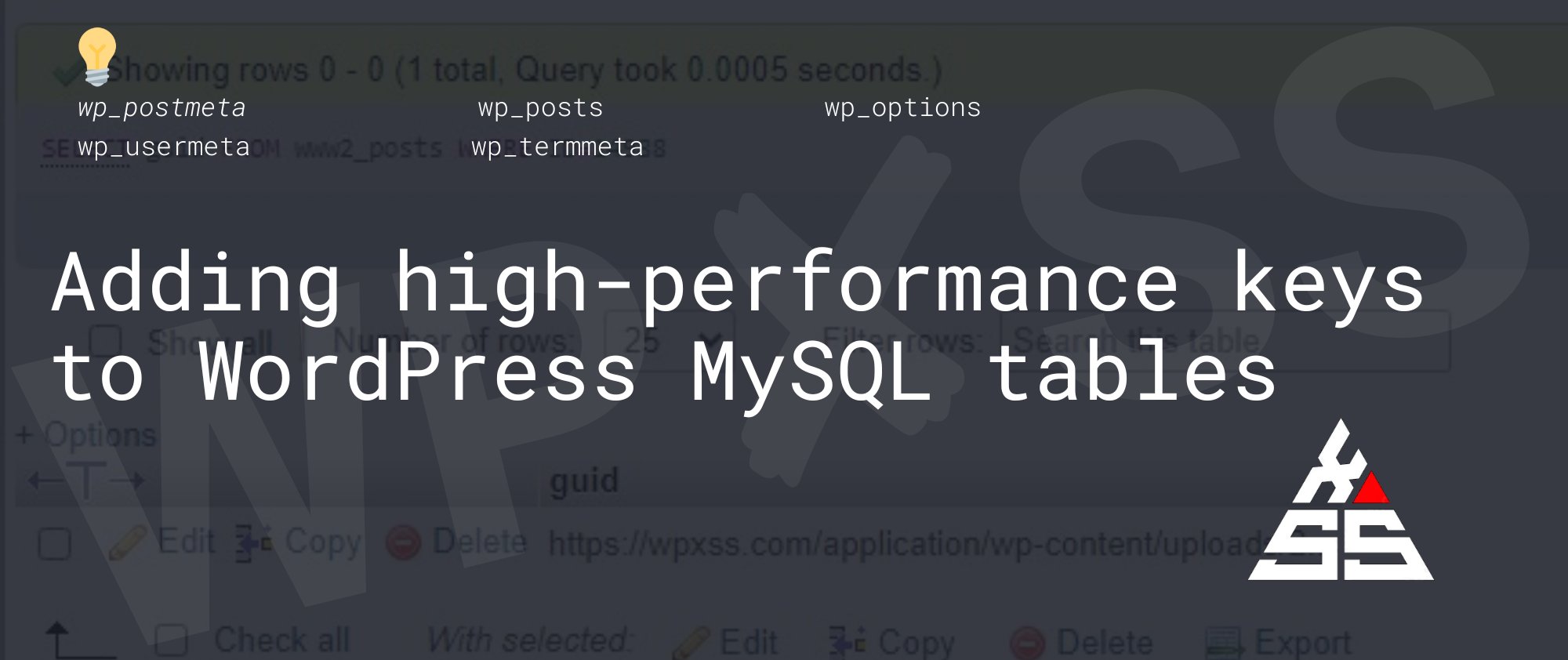wp_postmeta table should be the biggest table in your database, if not, there is a problem. Read wp_actionscheduler_actions & wp_actionscheduler_logs tables
When you install WordPress for the first time, tables are created in the database, for example for the wp_postmeta table:
CREATE TABLE wp_postmeta (
meta_id bigint(20) unsigned NOT NULL AUTO_INCREMENT,
post_id bigint(20) unsigned NOT NULL DEFAULT '0',
meta_key varchar(255) DEFAULT NULL,
meta_value longtext,
PRIMARY KEY (meta_id),
KEY post_id (post_id),
KEY meta_key (meta_key)
) ENGINE=InnoDB DEFAULT CHARSET=utf8;the problem?
- AUTO_INCREMENT slows down most queries, because of having to look in the secondary index to find auto_inc ID, then looking in data for the actual ID you need.
- BIGINT and AUTO_INCREMENT are overkill
- meta_key or meta_value will never be NULL 😀
solution:
CREATE TABLE wp_postmeta (
post_id BIGINT UNSIGNED NOT NULL,
meta_key VARCHAR(255) NOT NULL,
meta_value LONGTEXT NOT NULL,
PRIMARY KEY(post_id, meta_key),
INDEX(meta_key)
) ENGINE=InnoDB;On an existing tables, We can add high-performance keys that match the most common WordPress queries:
wp_postmeta
ALTER TABLE wp_postmeta ADD UNIQUE KEY meta_id (meta_id);
ALTER TABLE wp_postmeta DROP PRIMARY KEY;
ALTER TABLE wp_postmeta ADD PRIMARY KEY (post_id, meta_key, meta_id);
ALTER TABLE wp_postmeta DROP KEY post_id;
ALTER TABLE wp_postmeta DROP KEY meta_key;
ALTER TABLE wp_postmeta ADD KEY meta_key (meta_key, post_id);This will create new high-performance keys:
| Table | Standard WP keys | New keys |
|---|---|---|
| wp_postmeta | meta_id: primary key post_id meta_key | post_id, meta_key, meta_id: primary key meta_id: unique key meta_key, post_id |
We can do the same for other major tables:
wp_posts
ALTER TABLE wp_posts DROP KEY type_status_date;
ALTER TABLE wp_posts ADD KEY type_status_date (post_type, post_status, post_date, post_author, ID);
ALTER TABLE wp_posts DROP KEY post_author;
ALTER TABLE wp_posts ADD KEY post_author (post_author, post_type, post_status, post_date, ID);| Table | Standard WP keys | New keys |
|---|---|---|
| wp_posts | post_type, post_status, post_date,ID post_author | post_type,post_status,post_date,post_author,ID post_author,post_type,post_status,post_date,ID |
wp_options
ALTER TABLE wp_options ADD UNIQUE KEY option_id (option_id);
ALTER TABLE wp_options DROP PRIMARY KEY;
ALTER TABLE wp_options ADD PRIMARY KEY (autoload, option_id);
ALTER TABLE wp_options DROP KEY autoload;| Table | Standard WP keys | New keys |
|---|---|---|
| wp_options | option_id: primary key option_name: unique key autoload | autoload, option_id: primary key option_name: unique_key option_id: unique key |
wp_usermeta
ALTER TABLE wp_usermeta ADD UNIQUE KEY umeta_id (umeta_id);
ALTER TABLE wp_usermeta DROP PRIMARY KEY;
ALTER TABLE wp_usermeta ADD PRIMARY KEY (user_id, meta_key, umeta_id);
ALTER TABLE wp_usermeta DROP KEY user_id;
ALTER TABLE wp_usermeta DROP KEY meta_key;
ALTER TABLE wp_usermeta ADD KEY meta_key (meta_key, user_id);| Table | Standard WP keys | New keys |
|---|---|---|
| wp_usermeta | umeta_id: primary key user_id meta_key | user_id, meta_key, umeta_id: primary key umeta_id: unique key meta_key, user_id |
wp_termmeta
ALTER TABLE wp_termmeta ADD UNIQUE KEY meta_id (meta_id);
ALTER TABLE wp_termmeta DROP PRIMARY KEY;
ALTER TABLE wp_termmeta ADD PRIMARY KEY (term_id, meta_key, meta_id);
ALTER TABLE wp_termmeta DROP KEY term_id;
ALTER TABLE wp_termmeta DROP KEY meta_key;
ALTER TABLE wp_termmeta ADD KEY meta_key (meta_key, term_id);| Table | Standard WP keys | New keys |
|---|---|---|
| wp_termmeta | meta_id: primary key term_id meta_key | term_id, meta_key, meta_id: primary key meta_id: unique key meta_key, term_id |
The schema changes mentioned here are automated in Index WP MySQL For Speed WordPress plugin.
Source: MySQL Documents by Rick James
Speeding up WordPress database operations by Oliver Jones
Was this post helpful?
Let me know if you liked the post. That’s the only way I can improve. 🙂

